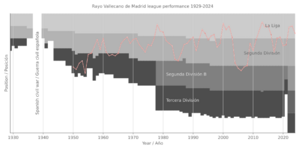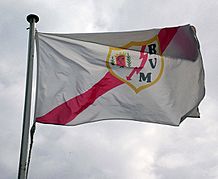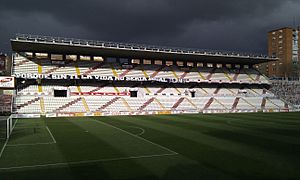Rayo Vallecano facts for kids
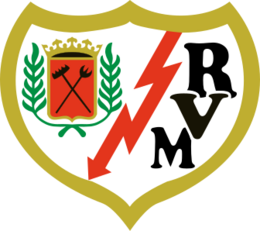 |
||||
| Full name | Rayo Vallecano de Madrid, SAD | |||
|---|---|---|---|---|
| Nickname(s) | Los Franjirrojos (The Red Sashes) Rayito (Little Thunderbolt) Orgullo de la clase obrera (The Pride of the Working class) El Matagigantes (The Giant-killer) |
|||
| Founded | 29 May 1924 as Agrupación Deportiva El Rayo | |||
| Ground | El Campo de Fútbol de Vallecas | |||
| Capacity | 14,708 | |||
| Coordinates | 40°23′30.6″N 3°39′30.9″W / 40.391833°N 3.658583°W | |||
| Owner | Raúl Martín Presa | |||
| President | Raúl Martín Presa | |||
| Head coach | Iñigo Pérez | |||
| League | La Liga | |||
| 2022–23 | La Liga, 11th of 20 | |||
|
||||
Rayo Vallecano de Madrid, S.A.D. is a professional football club from Madrid, Spain. People often call it Rayo, which means "thunderbolt" in Spanish. The club plays in La Liga, which is the top football league in Spain.
Rayo Vallecano was started on May 29, 1924. It's known for its strong connection to the local community and its working-class roots. The team plays its home games at the Campo de Fútbol de Vallecas stadium, which can hold 14,708 fans. They have played there since 1976.
Throughout its history, Rayo has spent 22 seasons in Spain's top league. They even played in a European competition, the UEFA Cup, during the 2000–01 season. In the 2017–18 Segunda División season, the club won the Segunda División title. Rayo is considered the third best club in the Community of Madrid, after Real Madrid and Atlético Madrid.
Contents
Club History
How Rayo Vallecano Started
Rayo Vallecano was founded on May 29, 1924. The idea came from Prudencia Priego, whose husband, Julián Huerta, was the club's first president. In 1949, the team added a red diagonal stripe to their uniform. This was inspired by the Argentinian club River Plate. After this, Rayo Vallecano reached the Tercera División for the first time.
Moving Between Leagues
Rayo Vallecano is often called a "yo-yo club" because it has moved up and down between La Liga (the top league) and Segunda División (the second league) many times. This happened a lot in the 1980s and 1990s. The club was always in the shadow of Madrid's two biggest teams, Real Madrid and Atlético Madrid.
The 1983–84 season was a tough one, as the club finished last in the Segunda División and was moved down to Segunda División B. A famous player named Laurie Cunningham played his last season for Rayo Vallecano in 1989. He had won the F.A. Cup with Wimbledon F.C. and played for Real Madrid before joining Rayo.
After being promoted in 1999, Rayo seemed to settle in the top league. Their most successful season was 2000–01. They reached the quarter-finals of the UEFA Cup! They got into this competition because of their good sportsmanship, through the fair play draw. They were eventually knocked out by Alavés.
Years in Lower Divisions
After their European adventure, the club faced difficulties. They were relegated twice in a row, in 2003 and 2004. For the 2005–06 season, Míchel, a famous player from Real Madrid, became the manager.
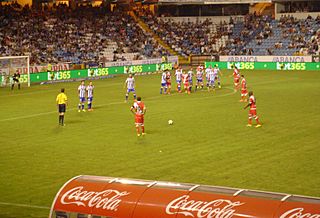
Rayo finished second in Segunda División B in 2007. They won their semi-final playoff match but lost in the final. The next year, they returned to the second division after four years away. They won their playoff games against Benidorm and Zamora.
In their first few seasons back in the second tier, Rayo played well. In 2010–11, they finished second and returned to La Liga after eight years. This was a great achievement, especially because the club was facing serious money problems.
Back to La Liga and More Changes
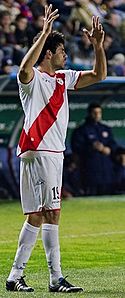
In March 2014, a company called Huawei sponsored Rayo Vallecano for two matches. In August 2015, Rayo Vallecano bought most of a new football team in the United States called Rayo OKC. This was the first time a Spanish club entered the American sports market. However, Rayo OKC stopped playing after one year because Rayo Vallecano was relegated from La Liga.
In May 2016, Rayo Vallecano was relegated to the Segunda División after finishing 18th in the 2015–16 La Liga season. This ended their longest stay in the top league, which was five years. Their first season back in the second division was difficult. They went through three managers before Míchel, a club legend, took over. He helped the team avoid relegation and finish 12th.
At the start of the 2017–18 Segunda División season, David Cobeño, a former goalkeeper, became the club's sporting director. Rayo Vallecano secured promotion back to La Liga by beating CD Lugo 1–0 with one game left. They won the Segunda División that season with 76 points.
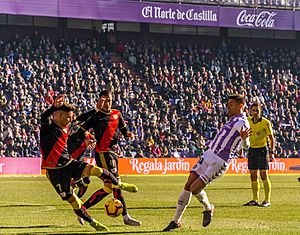
On March 20, 2019, Paco Jémez became the head coach again. On May 4, Rayo was relegated back to the Segunda División after losing to Levante UD. They finished last in the league.
In August 2020, Andoni Iraola was appointed head coach. The team finished sixth and won promotion back to La Liga through the playoffs against Girona FC. Even though they lost the first game at home, they won the second game away to earn a spot in La Liga for 2021–22. In February 2022, Iraola's team defeated RCD Mallorca to reach the semi-finals of the Copa del Rey. This was only the second time in the club's history and the first since 1982. The club finished 12th in La Liga, which was a great achievement for one of the league's smaller teams.
After finishing 8th in the 2024-25 La Liga season, Rayo Vallecano qualified for European football again after 24 years. They will play in the 2025-26 UEFA Conference League play-offs.
Club Names Over Time
- Agrupación Deportiva El Rayo (May 29, 1924 – November 13, 1947)
- Agrupación Deportiva Rayo Vallecano (November 13, 1947 – 1995)
- Rayo Vallecano de Madrid (1995–present)
Club Achievements
League Titles
- Segunda División
- Winners: 2017–18
- Runners-up: 1988–89, 1991–92, 1994–95, 2010–11
- Segunda División B
- Winners: 1955–56, 1964–65, 1984–85, 2007–08
Regional Titles
- Workers Federation of Soccer: 1931–1932
- First Regional Division: 1948–1949
- Second Regional Division: 1940–1941
- Copa de Castilla: 1952–1953, 1967–1968, 1970–1971, 1972–1973, 1981–1982
- Madrid Cup: 1952–1953, 1966–1967
- Copa Ramón Triana: 1971–1972, 1973–1974
European Competitions
Rayo Vallecano has played in European competitions a few times. Their best performance was reaching the quarter-finals of the UEFA Cup in the 2000–01 season.
| Season | Round | Club | Home | Away | Aggregate |
|---|---|---|---|---|---|
| 2000–01 UEFA Cup | Qualifying round | 6–0 | 10–0 | 16–0 | |
| First round | 1–1 | 1–0 | 2–1 | ||
| Second round | 1–0 | 1–2 | 2–2 (a) | ||
| Third round | 2–0 | 0–0 | 2–0 | ||
| Fourth round | 4–1 | 2–1 | 6–2 | ||
| Quarter-finals | 2–1 | 0–3 | 2–4 | ||
| 2025–26 UEFA Conference League | Play-offs | TBC |
The Stadium: Campo de Fútbol de Vallecas
The Campo de Fútbol de Vallecas is Rayo Vallecano's home stadium. It opened on May 10, 1976. It was first called "New Stadium Vallecas." In 2004, its name changed. This was to honor Teresa Rivero, who was the first woman president of a top football team.
The stadium can hold 14,708 fans. The field is 100 meters long and 67 meters wide. It's one of the smaller pitches in La Liga. One unique thing about the stadium is that one end behind a goal doesn't have seats. Instead, there's a large wall with information screens.
In 2009, the club announced plans for a new stadium. However, as of 2023, the local government, which owns the stadium, has no known plans to build a new one.
Club Culture and Fans
Rayo Vallecano and its fans are known for their strong connection to left-wing politics. The fans often show their feelings about social issues.
Many Rayo Vallecano fans do not get along well with the current owner, Raúl Martín Presa. They often chant for him to leave the club.
In March 2012, the team decided to skip one day of training. They joined public demonstrations to support protests happening in Spain at the time. In 2014, an 85-year-old woman named Carmen Martínez Ayuso was evicted from her home in Vallecas. She had lived there since the 1960s. Rayo Vallecano, especially coach Paco Jémez, was moved by her story. The club offered to help pay for her living expenses.
In February 2017, a Ukrainian player named Roman Zozulya left the club after just one training session. This happened because some Rayo fans chanted "Nazi" at him. They accused him of being part of far-right groups. Zozulya denied these claims. In 2019, when Zozulya played for Albacete, a match was stopped at halftime. This was because fans again sang "Zozulya you are a Nazi."
Club Songs and Anthems
While many people know the songs by the band Ska-P (like Rayo Vallecano and Como un rayo), Rayo Vallecano has an official anthem. This anthem is played at their home stadium before matches.
The club's fan group, the Bukaneros, are named after pirates. They are famous for singing "La Vida Pirata" (which means "The Pirate Life"). It's a fun song about pirates.
Spanish:
La vida pirata es la vida mejor (bis)
sin trabajar (bis)
Sin estudiar (bis)
Con la botella de ron (bis)
Soy capitán (bis)
del Santa Inés (bis)
Y en cada puerto tengo una mujer (bis)
La rubia es (bis)
Fenomenal (bis)
Y la morena tampoco esta mal (bis)
Las inglesas con su seriedad (bis)
Y las francesas que todo lo dan (bis)
Si alguna vez (bis)
Me he de casar (bis)
Me he de casar (bis)
Con la del Rayo, una, una y nada más (bis).
English:
''The pirate life is the best life (bis)
without working (bis)
without studying (bis)
With the bottle of rum (bis)
I am captain (bis)
of the "Santa Inés"' (bis)
and in each port, I have a woman (bis)
the blonde is (bis)
phenomenal (bis)
and the brunette is not bad either (bis)
The English women with their seriousness (bis)
And the French women who give everything (bis)
If ever (bis)
I have to marry (bis)
I have to marry (bis)
with the one of Rayo, one, one and no more (bis)''
See also
 In Spanish: Rayo Vallecano de Madrid para niños
In Spanish: Rayo Vallecano de Madrid para niños
 | James Van Der Zee |
 | Alma Thomas |
 | Ellis Wilson |
 | Margaret Taylor-Burroughs |


